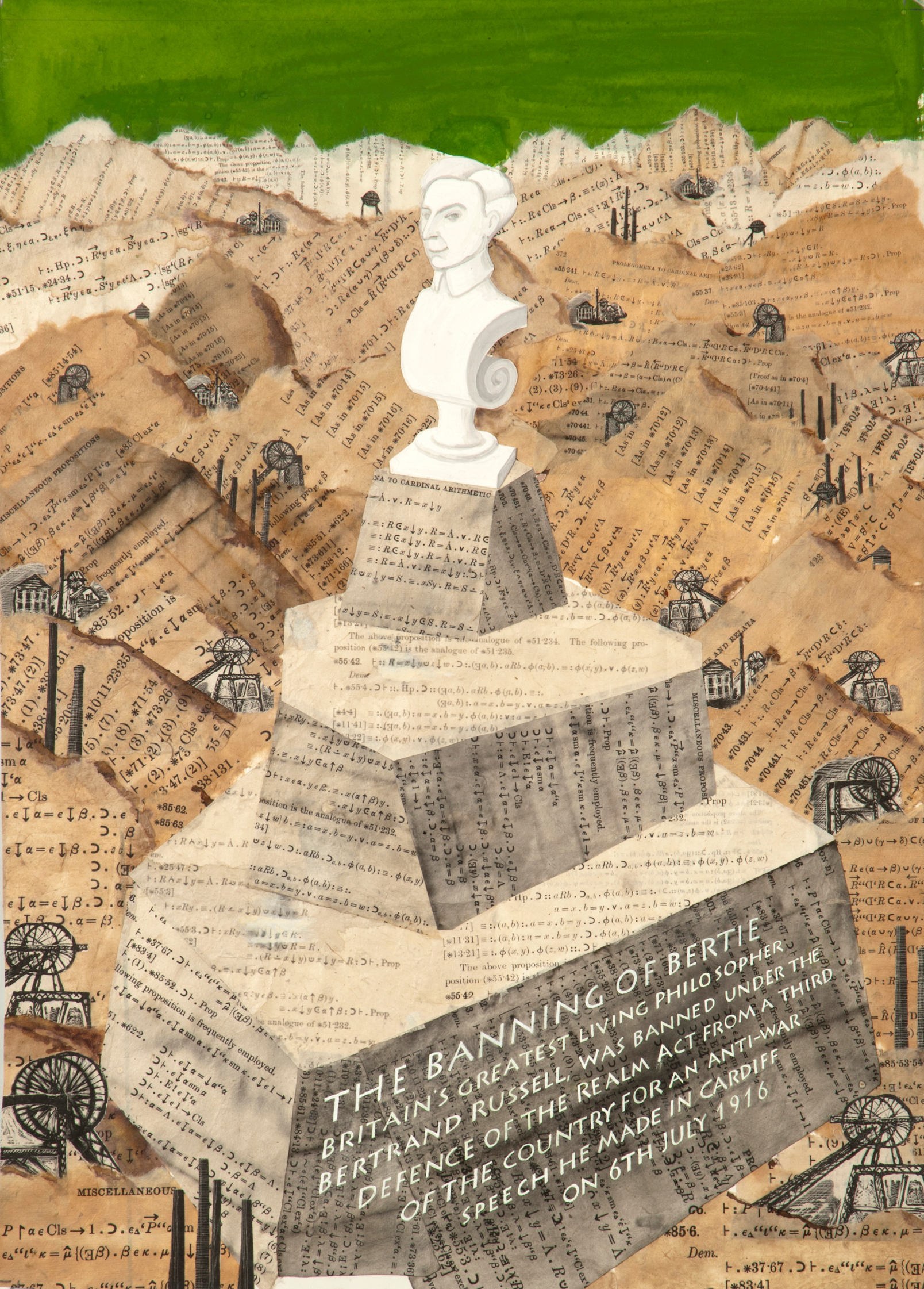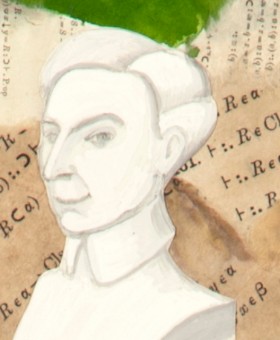 He knew that the police had been taking down his every word and was anticipating a lengthy prison sentence as a result. [2] This was the sixth day of his twenty-four day speaking tour, and things were going well. [3]
He knew that the police had been taking down his every word and was anticipating a lengthy prison sentence as a result. [2] This was the sixth day of his twenty-four day speaking tour, and things were going well. [3]
The publicity from his last trial had undoubtedly helped to bring people out: at Briton Ferry the hall had been packed – and a resolution in favour of immediate peace negotiations had been carried unanimously, barring the two plain clothes policemen who had come to take notes – while at Port Talbot, home to an enormous steelworks, a crowd of 400 – including the congregations of two nearby chapels – had come and ‘listened with the closest attention’ to him speak at a green in the town and had appeared to be ‘unanimously sympathetic’. [4] Here at least, the latest Allied offensive on the Somme, had not rallied people around the flag. [5]
Cardiff, it seemed, was a little different, for today there had been some antis – including some soldiers – in the audience. [6] However, he relished the opportunity to reach out to the unconverted, and – apart from ‘[a] blood-thirsty middle-aged man, who mendaciously said he was a soldier … [and] spoiled his case by violence’ – they had not caused any problems. [7]
The next day he received a letter from Harvard telling him that he had been denied a passport to travel to the US. [8] Four days later he was dismissed from his job. [9] And fifty-one days after that he was banned from ‘an area constituting one-third of [Britain]’. [10]
The date of the Cardiff meeting was 6 July 1916 [11], and the speaker was Bertrand Russell, Britain’s greatest living philosopher. [12]
Eight fleas
Russell had opposed the war from its outset, writing, in a letter to the Nation, published on 15 August 1914, that:
‘[A]ll this madness, all this rage, all this flaming death of our civilisation and our hopes, has been brought about because a set of official gentlemen, living luxurious lives, mostly stupid, and all without imagination or heart, have chosen that it should occur rather than that any one of them should suffer some infinitesimal rebuff to his country’s pride.’ [13]
‘I never had a moment’s doubt as to what I must do’, he later wrote. ‘I knew that it was my business to protest, however futile protest might be’. [14]
And some of it did feel futile. Invited to the discussions leading to the founding of the ‘anti-war’ [15] Union for Democratic Control, shortly after the war began, he had not been impressed, describing them as ‘like 8 fleas talking of building a pyramid’. [16]
The No-Conscription Fellowship
 At least in the early stages of his involvement the No-Conscription Fellowship (NCF) was more to Russell’s liking. [17]
At least in the early stages of his involvement the No-Conscription Fellowship (NCF) was more to Russell’s liking. [17]
The brainchild of Fenner Brockway’s wife Lilla, the NCF was founded in November 1914. [18] As its name suggests, it aimed to oppose the introduction of conscription and (later) to support resisters, though Russell’s interest in it ‘was primarily in its potential as a force against the war and against militarism generally.’ [19]
Russell started working with the organisation in April 1916, one month after conscription came into force, beginning a maelstrom of activity that would occupy him for much of the next 16 months. [20]
In addition to speaking, writing articles, visiting prisoners and huge volumes of administrative work [21], he would: help save the lives of at least some of the thirty five conscientious objectors (COs) who were shipped to France and sentenced to death for their resistance [22]; assist Siegried Sassoon in the drafting of his famous declaration ‘Finished with the war’ [23]; and ghost write a pamphlet, I Appeal Unto Caesar, that helped secure the release of some 300 imprisoned COs, probably saving at least one more life in the process. [24]
On 5 June 1916, Russell had been found guilty of ‘making statements likely to prejudice the recruiting and discipline of His Majesty’s forces’ after publicly declaring his authorship of an NCF leaflet entitled ‘Two Years’ Hard Labour for Refusing to Disobey the Dictates of Conscience’. [25]
Stomping the Country
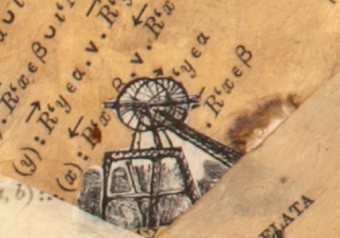 Though he was ‘long[ing] to stomp the country on a stop-the-war campaign’, the trial had delayed Russell’s tour of South Wales. [26] Nonetheless, it helped ‘[ensure] large attendances’. [27]
Though he was ‘long[ing] to stomp the country on a stop-the-war campaign’, the trial had delayed Russell’s tour of South Wales. [26] Nonetheless, it helped ‘[ensure] large attendances’. [27]
In all he gave roughly 35 talks [28] and, though ‘[t]he bulk of the [Welsh] population seems to have remained “patriotic” throughout’ the war, almost always received an enthusaistic response. [29] On at least one occasion he spoke to as many as 2,000 people, while an outdoor meeting in Swansea was so immense that he became hoarse from shouting. [30]
Russell ‘said that he was always aware of the presence of a police shorthand writer’, though as it turned out the person taking notes in Cardiff – at the suggestion of the local head constable – was actually E. Ellis Hughes, the chief reporter from the Western Mail. [31]
Russell spoke without notes, so the transcription from Hughes’ short-hand notes is the only known complete account of any of his speeches from the tour. [32]
‘A wish for dominion’
He starts by asserting that he does not believe that ‘there is now any good and valid reason why this war should continue to be prosecuted’, before proceeding to dismantle what he says are the three reasons given for Britain entering the war in the first place: Belgium, ‘the protection of France’ and the ‘destruction of German militarism’. [33]
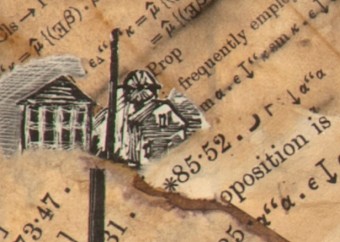 Citing the right-wing Morning Post‘s assertion that ‘There is reason to believe that Germany is anxious to end the war, but only on the basis of the status quo existing on August 1st 1914′ – as well as similar statements from the Daily Express and Westminster Gazette – Russell argues that ‘we are not fighting for [Belgium and France], for the day an armistice is concluded they will be relieved from German occupation’. [34]
Citing the right-wing Morning Post‘s assertion that ‘There is reason to believe that Germany is anxious to end the war, but only on the basis of the status quo existing on August 1st 1914′ – as well as similar statements from the Daily Express and Westminster Gazette – Russell argues that ‘we are not fighting for [Belgium and France], for the day an armistice is concluded they will be relieved from German occupation’. [34]
As for destroying German militarism, Russell says, presciently, that Allied military success will only force Germans to ‘conclude that their militarism was not military enough, that they must have greater militarism still, and that in other times they must be prepared with even greater guns’. [35]
He also deployed economic arguments – noting that for the £5m per day that was being spent ‘slaughtering Germans and … slaughtering ourselves in the job’ Britain could have turned itself into a paradise [36] – and asserted that Russia’s ‘desire to possess Constantinople is, I think, the main cause of the continuation of this war now.’ [37]
The latter claim – interesting in the light of recent scholarship [38] – is known to have caused particular concern in the Home Office. [39]
At a more general level, Russell maintained, plausibly, that the war continued because ‘there is in men who have the habit of power and the experience of power, almost inevitably, a love of power, for nothing makes man love power like the possession of it, and therefore … You will find [in Goverments and in persons in high places] … a wish for dominion’. [40]
‘Miserable, pro-German, sentimental traitors’
 The ‘blood-thirsty’ member of the audience who ‘said he was a soldier’, was a soldier: Captain Atherley Jones, the organizing secretary of the far-right British Empire Union. [41] In the transcript he is recorded as saying that Russell ‘who has been convicted already for issuing seditious pamphlets, ought to be locked up’, though the report in the next day’s Western Mail also has him taking the opportunity to denounce the gathering as ‘a lot of miserable, pro-German, sentimental traitors’. [42]
The ‘blood-thirsty’ member of the audience who ‘said he was a soldier’, was a soldier: Captain Atherley Jones, the organizing secretary of the far-right British Empire Union. [41] In the transcript he is recorded as saying that Russell ‘who has been convicted already for issuing seditious pamphlets, ought to be locked up’, though the report in the next day’s Western Mail also has him taking the opportunity to denounce the gathering as ‘a lot of miserable, pro-German, sentimental traitors’. [42]
In any event, no official action was taken until Atherley-Jones had a letter published in the Daily Express three weeks later, giving his own account of Russell’s speech and stating that he, Atherley Jones, had ‘denounced [Russell] as a traitor’. [43]
This led to the Home Secretary, Herbert Samuel, requesting a transcript of the speech. [44]
The Public Prosecutor, Charles Matthews, judged that it would strain the Defence of the Realm Act (DORA) regulations ‘to bring any but an infinitesimal part of [Russell’s] speech within them’ [45]. So instead, he recommended instructing the Official Press Bureau that no meeting attended by Russell was ever to be mentioned in the press, and that the police seize ‘whatever Bertrand Russell may print, either in pamphlet or in leaflet form’.[46] While not enacted, this suggestion provides a perfect illustration of the Government’s commitment, or lack thereof, to freedom of expression within the law.
Prohibited Areas
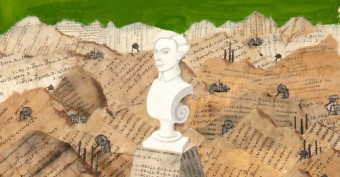 At around noon on 1 September 1916, two men in plain clothes served a notice on Russell prohibiting him from ‘resid[ing] in or enter[ing]’ any area designated ‘prohibited’ under the Aliens Restrictions Act 1914: about one-third of the country. [47]
At around noon on 1 September 1916, two men in plain clothes served a notice on Russell prohibiting him from ‘resid[ing] in or enter[ing]’ any area designated ‘prohibited’ under the Aliens Restrictions Act 1914: about one-third of the country. [47]
The Aliens Restrictions Act, which had been brought in within days of Britain’s declaration of war, enabled the Government to restrict the movements of foreign nationals with a view to preventing espionage, and Russell was incensed by the implication that he might ‘want to give military information to the Germans’. [48] Moreover, prevented from travelling to the US to take up an academic appointment at Harvard and dismissed from his lectureship at Trinity [49], he was now dependent upon lecture fees for his income, and the ban prevented him from giving planned talks in Glasgow, Edinburgh and Newcastle. [50]
Four days later Russell met with General George Cockerill at the War Office, and the latter offered to lift the ban if Russell ‘would abandon political propaganda and return to mathematics’, which Russell naturally refused to do. [51]
When Cockerill told Russell that he suspected the inner voice of ‘no longer being conscience’ when it became ‘blatant and strident’, Russell responded that Cockerhill failed to apply this principle ‘to those who write and speak in favour of the war’. [52]
The last laugh
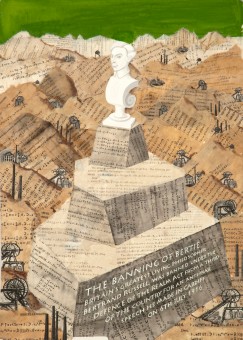 Cockerill then asked him whether there was ‘some lack of a sense of humour in going on reiterating the same thing?’
Cockerill then asked him whether there was ‘some lack of a sense of humour in going on reiterating the same thing?’
So indignant was Russell ‘at Cockerill’s elevation of the exercise of ‘a sense of humour’ over the exercise of conscience that he refused for the rest of his life to lay claim to the quality’, writing, in 1932:
‘I gathered than if I had had my proper share of the sense of the ludicrous, I should have been highly diverted at the thought of several thousand men a day being blown to bits, which I confess to my shame, never caused me even to smile’. [53]
Nonetheless, despite this lack, Russell still had the last laugh.
On 17 October 1916, the President of the Miners’ Federation of Great Britain, Robert Smillie, departed from his usual practice to read his talk at a thousand-strong protest meeting in Glasgow. After speaking for a considerable length of time, Smillie revealed to his audience – who were aware of the ban – that he was actually reading the lecture that Russell had been prevented from giving.
According to the Glasgow Herald: ‘This announcement was received with laughter, followed by prolonged applause’.[54]
ENDNOTES
[1] Bertrand Russell, Autobiography, Unwin, 1987, p. 262. A ‘Red Tab’ is ‘a high-ranking officer in the British army ‘: http://www.merriam-webster.com/dictionary/redtab
[2] Jo Vellacott, Bertrand Russell and the Pacifists in the First World War, Palgrave MacMillan, 1981, p. 88. At the time Russell wrote that ‘The Police took down every word’. See below for further discussion of the police presence at the event, and the identity of the note-taker. Reporting on a talk by Russell in Cwmavon on 11 July, the Merthyr Pioneer, noted that ‘seven police officers and a shorthand reporter’ were all in attendance, the latter ‘apparently acting on behalf of the police’ (Merthyr Pioneer, 15 July 1916).
[3] Bernd Frohmann, Mark Lippincott & Richard A. Rempel (eds), The Collected Papers of Bertrand Russell, Volume 13: Prophecy and Dissent, 1914-16, Routledge, 2000, p. 420. Russell described the Briton Ferry meeting as ‘wonderful’, and the state of feeling in Port Talbot as ‘quite astonishing’ (Vellacott, op. cit., p. 87).
[4] Ray Monk, Bertrand Russell: The Spirit of Solitude, Vintage, 1997, p.466; Vellacott, op. cit. Not all of Russell’s speaking engagements were so well attended. Reporting on a talk Russell gave at Abertillery on 20 July, the Merthyr Pioneer noted that ‘The evening was very warm, so that fact probably accounted for there being only a moderate audience present.’ (Merthyr Pioneer, 29 July 1916).
[5] The Battle of the Somme began on 1 July 1916. In a letter describing the Briton Ferry meeting Russell noted that he ‘thought the latest great offensive would have excited [his audience], but it hasn’t’ (Vellacott, op. cit.)
[6] Ibid., p. 88.
[7] Ibid. It is unclear what the ‘violence’ consisted of.
[8] Frohmann et al, op. cit., p. lxxxix.
[9] Ibid.
[10] Ibid., p. lxiv. The original wording is ‘an area constituting one-third of the country’ – so it’s a matter of inference that the country in question is Britain rather than, say, the United Kingdom of Britain and Ireland – see note 47 below for more information on the areas that Russell was banned from. Although Russell received the banning on 1 September 1916, it was dated 31 August 1916 (Lt-Col Alich Russell to Bertrand Russell, ‘Order Prohibiting a Person Residing in or Entering Specified Areas’, 31 August 1916, Russell Papers, Volume 805, McMaster University).
[11] Ibid., p. lxxxix. Monk (op. cit., p. 467) also gives the date as 6 July. Vellacott (op. cit., p. 88) gives the date (incorrectly) as 7 July.
[12] Though he spent most of his life in England, Russell was actually born in Wales (thanks to Ian Morgan for drawing this to our attention).
Noam Chomsky – who famously has a poster of Russell in his office (see eg. Mark Achbar & Peter Wintonick (dirs), Manufacturing Consent: Noam Chomsky and the Media, 1992) – has drawn attention to ‘the instant dedication of intellectuals to the cause of their own states [during the First World War], with a small fringe of notable exceptions, almost all of whom were punished for their sanity and integrity’ (Noam Chomsky and the Plymouth Institute for Peace Research, ‘Dark Clouds Loom: In the Shadow of the First World War, Noam Chomsky Discusses ISIS, Ukraine, and Gaza’, 16 October 2014, http://www.pipr.co.uk/all/dark-clouds-loom-in-the-shadow-of-the-first-world-war-noam-chomsky-discusses-isis-ukraine-and-gaza/). Russell was undoubtedly part of that ‘small fringe’, but his brilliance and wit should not prevent us from acknowledging his less savoury political views.
For example, at least at the war’s outset, Russell had ‘a tendency to conceive the war in racial terms’, writing of the ‘ethnic inevitability’ of the war in the East, of a ‘highly civilised’ Austria ‘half-surrounded by Slavs in a relatively backward state of culture’, and of Germany’s fears that it would be ‘overrun by the Russian hordes’ His ‘remarks about Russia’, his biographer Raymond Monk notes ‘echo the language of anti-German hysteria’: ‘Hatred of Russians, he implies, is only to be expected among civilised people.’ (Monk, op. cit., p. 373).
Even more horrible is his 1915 essay ‘The Ethics of War’. There he claims that, despite their being ‘apt to be more ruthless than any other war’, ‘wars of colonisation’ – in which the ‘purpose is to drive out the whole population of some territory and replace it by an invading population’ – ‘may be justified’ so long as there is ‘a very great and undeniable difference between the civilisation of the colonisers and the dispossessed natives’ (Bertrand Russell, Justice in War-Time, Spokesman, 2005 [first published 1916], p. 27-28). As Monk notes: ‘What shocks the reader now about this article ….went unremarked upon at the time of its publication’ (Monk, op. cit., pp. 383 – 384).
Perhaps even more shocking is the fact that such views have continued to be expressed much more recently. Compare, for example, Russell’s assertion that ‘we cannot at this date bring ourselves to condemn the process by which the American continent has been acquired for European civilisation’ (ibid.), with Christopher Hitchens’ 1992 statement that: ‘Those who view the history of North America as a narrative of genocide and slavery are, it seems to me, hopelessly stuck on this reactionary position … The transformation of part of the northern part of this continent into ‘America’ inaugurated a nearly boundless epoch of opportunity and innovation, and thus deserves to be celebrated with great vim and gusto.’ (Christopher Hitchens. ‘Minority Report’, Nation, 19 October 1992, cited in Richard Seymour, Unhitched: The Trial of Christopher Hitchens, Verso, 2012, p. 74). Note that this statement was made before Hitchens’ post-9/11 volte face. For futher reflections on Hitchens’ political evolution see Norman Finkelstein, ‘Fraternally yours, Chris’ (13 June 2006, http://normanfinkelstein.com/2006/06/13/on-christopher-hitchens).
[13] Bertrand Russell, Autobiography, Unwin, 1987, p. 265.
[14] Ibid., p. 240.
[15] The Union’s September 1914 manifesto, which was published in the Manchester Guardian ’emphasised that the UDC was not a stop-the-war movement and did not intend to urge peace negotiations at this stage’ (F.L. Carsten, War Against War: British and German Radical Movements in the First World War, Batsford, 1982, p. 31). Instead, the Union’s ‘principal attack was directed at [the] secret diplomacy’ that it believed had caused the war.
[16] The ‘8 fleas’ description appears in a letter to Ottoline Morrell from Russell dated 11 August 1914 (Monk, op. cit.,p. 370).
[17] Monk, op. cit., p. 458. Russell’s critical reflections on his time in the WW1 peace movement (Bertrand Russell, ‘Some Psychological Difficulties of Pacifism in Wartime’, 1935) will resonate with anyone who has been involved in activism for any length of time eg. his reference to ‘some men’ in whom ‘the habit of standing out against the herd became so ingrained that they could not co-operate with anybody about anything’. Likewise, his observation that some British anti-war campaigners ‘made out such a good case for the German government that they embarrassed German pacifists, who were trying to persuade their public that the faults were not all on our side’, or his experiences of attending meetings ‘nominally opposed to all war [where] the threat of violent revolution was applauded to the echo.’
According to David Mitchell, Russell ‘regarded the differences among the various types in what he called “the pacifist herd” with a certain detached amusement and was very good at dealing with the religious cranks who dropped in from time to time. One man, inflamed with zeal, leaned over Russell’s shoulder as he sat writing at his desk and shouted: “I am Jesus Christ!” “Yes,” was the deflating reply, “that’s what the other man said.”‘ (David Mitchell, Women on the warpath. The story of the women of the First World War, Jonathan Cape, 1966, p. 338).
[18] Thomas C. Kennedy, The Hound of Conscience: A History of the No-Conscription Fellowship, 1914 – 1919, University of Arkansas Press, pp. 43, 46. Following a meeting of some of its prime movers in late November 1914, a letter appeared in the Labour Leader on 3 December 1914, advertising the formation of the NCF.
[19] Monk, op. cit., p.460. See Kennedy, op. cit., p. 51 for the NCF’s spring 1915 statement of principles.
[20] Russell began working with Catherine Marshall – whom he already knew through his pre-war involvement in the campaign for women’s suffrage – on the Associates Political Committee of the NCF in April 1916 (Frohmann et al., op. cit., pp. lxxxv – xciii; Richard A. Rempel, Louis Greenspan, Beryl Haslam, Albert C. Lewis & Mark Lippincott (eds), The Collected Papers of Bertrand Russell, Volume 14: Pacifism and Revolution, 1916 – 1918, pp. lxv – lxxii). He maintained a hectic schedule of NCF activities for the next year, though by the early spring of 1917 he had become disenchanted with the organisation (Frohmann et al, op. cit., p. lxxxv – lxvii; Monk, op. cit., p.492). The March 1917 revolution in Russia temporarily rekindled his passion for activism, but following a ‘patriotic’ attack on the July 1917 meeting at the Brotherhood church, where Russell had hoped to be elected to a workers’ council, ‘marked the end of [his] involvement in revolutionary politics’ (ibid., pp. 493, 501). Already in May he had told Marshall that he disliked his work for the NCF so much ‘that I should be overjoyed if I could have a painful and dangerous illness from now till the end of the war’ (ibid., p. 496).
[21] Adam Hochschild, To End All Wars: How the First World War Divided Britain, MacMillan, 2011, p. 189; Kennedy, op. cit., p. 219.
[22] Russell was part of a 11 May 1916 delegation to the Prime Minister, Herbert Asquith, concerning the fate of these COs (who had not yet been condemned to death at that time). The MP Philip Morrell was another member of the delegation, which was co-ordinated by the indefatigable Catherine Marshall. The extraordinary sexual charisma of Morrell’s wife (and Russell’s lover) Ottoline may have helped, as Asquith had ‘tried more than once … to transform himself from Ottoline’s father figure to her lover’ (Will Ellsworth-Jones, We Will Not Fight … The untold story of World War One’s Conscientious Objectors, Aurum, 2008, pp. 194 – 196, 203). Russell had encountered Asquith before, when he, Russell, was climbing naked from a pond at the Morrell’s. ‘The quality of dignity which should have characterised a meeting between the Prime Minister and a pacifist was somewhat lacking on this occasion’, he later wrote (Bertrand Russell, Autobiography, Unwin, 1987, p. 247). In the end the 35 all had their death sentences ‘commuted to ten years penal servitude’ (Ellsworth-Jones, op. cit., p. 173). But for Asquith’s intervention ‘some at least of the conscientious objectors shipped to France would almost certainly have been executed’ (ibid., p. 203).
[23] Monk, op. cit., p. 500.
[24] Hochschild, op. cit., pp. 271 – 2, 303 – 4. One of the 300, Clifford Allen, ‘was in such a precarious state of health that he was simply transferred from Winchester prison hospital to a nursing home’ (Kennedy, op. cit., p.192). At least 73 COs died as a result of the treatement that they received following their arrest, including 10 who actually died in prison (William Chamberlain, Fighting for Peace: The Story of the War Resistance Movement, Garland Publishing, 1971, pp. 98 – 100; see also http://www.ppu.org.uk/cosnew/cos17.html).
[25] The NCF had distributed ½ a million copies of the leaflet – which concerned the harsh treatment of a CO named Ernest Everett – and this had led to the arrest and imprisonment of six men in various courts around the country (Monk, op. cit., p. 462; G.H. Hardy, Bertrand Russell and Trinity, Cambridge University Press, 1970, pp. 33 – 35). When Russell became aware of these prosecutions he wrote a letter to the Times declaring that he was the author and that ‘if anyone is to be prosecuted I am the person primarily responsible’ (Monk, op. cit., p. 463).
The timing of Russell’s prosecution suggests that the Home Office may have decided to prosecute him under pressure from the Foreign Office, to create a pretext for denying him a passport: after theTimes letter appeared, a senior official in the Foreign Office made it clear that he regarded Russell as ‘one of the most mischievous cranks in the country’, whom it would be ‘folly’ to permit to go to the US (Monk, op. cit., p.464). The prosecutor in the case was Archibald Bodkin.
According to G.H. Hardy, Russell was somewhat handicapped at his trial by the fact that the prosecutor, Archibald Bodkin – ‘whose oratory was [even] worse than his law’ – failed to state a case for Russell to answer (Hardy, op. cit., pp. 35 – 36). He was found guilty and fined £100 plus £10 costs, and the contents of his room at Trinity College Cambridge, where he held a lectureship, were seized in order that their contents could be auctioned off to pay the fine (Hardy, op. cit., p. 40, a copy of the advertisement for the auction appears in Frohmann et al, op. cit.).
Copies of a pamphlet (‘Rex v Bertrand Russell’) consisting of verbatim extracts from the trial were subsequently seized during a raid on the NCF office because it contained passages in which Bodkin ‘quoted the [original] leaflet paragraph by paragraph with his criticism’ (Frohmann et al, op. cit., pp. 445, 447). The various outcomes of Russell’s trial were raised in Parliament in October. This was not long after ‘The great case of Bodkin v Bodkin’, leading Russell to write to his friend the MP Charles Trevelyan suggesting that Trevelyan ‘might point out … that Bodkin never opens his mouth without saying things which it is illegal to repeat’ (ibid., p. 445).
[26] Monk, op. cit., pp. 462-3 (emphasis in original); Vellacott, op. cit., p. 86.
[27] Monk, op. cit., p. 466.
[28] Frohmann et al, op. cit., p. 420. The chronology in his Collected Papers lists the following places on Russell’s Welsh itinerary: Port Talbort, Briton Ferry, Ystradgnlais, Cwmavon, Cardiff, Pontypridd, Merthyr Tydfil, Abercanaid, Pentrebach, Troed-y-rhiw, Dowlais, Swansea, Pontypool, Bargoed, Abertillery, Newport, and Brynmawr (ibid., pp. lxxxviii – xc).
[29] Kenneth Morgan, ‘Peace Movements in Wales 1899 – 1945’, Welsh History Review, Vol. 10, No 3, 1981, p. 416; Vellacott, op. cit., p. 87.
[30] Ibid.
[31] Ibid., p.88. According to Vellacott there were also no less than three policemen present.
[32] Frohmann et al, op. cit., p.420. Russell later disputed that he had made some of the statements that appear in the transcript, but the wording and ideas expressed are very similar to a report of another of Russell’s speeches that appeared in the Merthyr Pioneer on 15 July, lending credence to the document’s accuracy (ibid., 420 – 422).
[33] Frohmann et al, op. cit., pp. 423, 425.
[34] Frohmann et al, op. cit., pp. 425 – 426. In a 1935 essay, Russell stated that he and other British pacifists took the German Government’s various peace offers ‘more seriously than they deserved’ (Bertrand Russell, ‘Some Psychological Difficulties of Pacifism in Wartime’, 1935).
In the Q&A session after the talk Russell asserted that ‘it is quite clear that if we had advised the Belgians to allow the Germans to pass through the Belgians would not have resisted’ (Frohmann et al, op. cit., p. 431). This appears to be correct. Indeed, the Belgian king complained that the Britain’s Foreign Secretary, Edwards Grey, had ‘practically given Belgium instructions to defend herself’ and that ‘Belgium would probably have permitted the Germans to go through upon guarantee that Belgian integrity would subsequently be respected.’ (Douglas Newton, Darkest Days: The Truth Behind Britain’s Rush to War, 1914, Verso, 2014, pp. 341-342).
In December 1912, at a meeting of the British Committee of Imperial Defence, Churchill and Lloyd George had both argued that Belgium could not remain neutal in the event of a war: ‘They must either be friends or foes.’ (Niall Ferguson, The Pity of War, Penguin, 1998, pp. 66-67).
The meeting concluded that if Belgium were not ‘entirely friendly … we should limit their overseas trade’. ‘In other words’, notes Niall Ferguson, ‘if Germany had not violated Belgian neutrality in 1914, Britain would have.’
[35] Frohmann et al, op. cit., p. 427.
[36] Ibid., p. 430. The vast opportunity costs of the war are seldom taken into account by those, like Jeremy Paxman, who extol its alleged virtues. Thus Paxman states that ‘The people who did best were the poor especially the very poor’ but says nothing about what could have been done for social justice with Britain’s war expenditure of £9,593m (‘The Eleventh Hour’, BBC1, first broadcast 17 February 2014; Newton, op. cit., p. 309). The latter figure should be compared with Britain’s total peacetime budget of £207m in May 1914 (Newton, op. cit.). It should also be stressed that Britain in 1914 was more of a hell than a paradise for large sections of its population: ‘The only way to visualise … the material conditions of much of the British population in 1914’, notes historian Adrian Gregory, ‘is to summon up the image of a contemporary third-world slum. Ill health, insecurity, grinding poverty and resigned hopelessness … were the lot of much of the population in1914’ (Adrian Gregory, The Last Great War: British Society and the First World War, Cambridge University Press, 2008, p. 278).
[37] Frohmann et al, op. cit., p. 428.
[38] In November 1914 the British Foreign Office effectively ‘promised Russia Constantinople and the Straits, whether or not she contributed in any way to a military campaign that might conquer them’, proceeding to ‘risk … British lives and naval vessels on a chancy campaign that served almost exclusively Russian interests’ with the ill-fated Dardanelles Campaign and the Battle of Gallipoli. Though Churchill harboured fantasies of ‘ending the world war with one decisive blow at the Straits’, a significant factor was probably averting Petrograd from ‘cut[ting] a separate peace with Berlin’. Nearly 50,000 Allied and 56,000 Ottoman soldiers were killed. (Sean McMeekin, The Russian Origins of the First World War, Harvard University Press, 2013, pp. 124, 126-8, 135, 139).
[39] Vellacott, op. cit., p. 89.
[40] Frohmann et al, op. cit., p. 424.
[41] Brock Millman, Managing Domestic Dissent in First World War Britain, Frank Cass, 2000, p. 150.
[42] Frohmann et al, op. cit., p. 434; Vellacott, op. cit., p. 88.
[43] Vellacott, op. cit., p. 89.
[44] Ibid.
[45] Ibid., p. 90.
[46] Frohmann et al, op. cit., p. lxiv.
[47] Monk, op. cit., p. 471; Lt-Col Alich Russell to Bertrand Russell, ‘Order Prohibiting a Person Residing in or Entering Specified Areas’, 31 August 1916, Russell Papers, Volume 805, McMaster University. Alich Russell was Bertrand Russell’s cousin (Frohmann et al, op. cit., p. 453). The list of prohibited areas included the whole counties of Norfolk, Monmouthshire, Glamorganshire, Suffolk, Sussex, Argyllshire, Buteshire, Orkney, Ross and Cromarty, Cork, Dublin and Kerry, as well the Isle of Wight and hundreds of districts, boroughs and parishes around Great Britain and Ireland. In London they included ‘[t]he area containing St Katherine’s, London, Surrey Commerical, West India, Millwall and East India docks.’ (Appendix C, The Aliens Restriction Orders Consolidated, pp. 629 – 651 in Alexander Pulling (ed), Manual of emergency legislation, comprising all the Acts of Parliament, Proclamations, Orders, etc., passed and made in consequence of the war to September 30th, 1914 [with Supplements nos. 1-4, to August 31st 1915]).
[48] Sarah Tudor, ‘Britain and the First World War: Parliament, Empire and Commemoration’, House of Lords Library Note, 24 March 2014, pp. 4 – 5; Vellacott, op. cit., p. 93.
Russell wrongly supposed that the ban had been imposed ‘for fear that he would stir up labout unrest’ (Frohmann et al, op. cit., p. 453). However, the Government’s real motive in issuing the ban, was to prevent him from keeping an appointment to meet COs engaged in ‘alternative service’ at a work camp in Haverhill, Suffolk.
‘Alternative service’ – providing alternative civilian work for those imprisoned for refusing to accept non-combatant military service – was proving an effective weapon against the NCF, and the Government feared that Russell might persuade the COs at Haverhill to turn their backs on the scheme. (Monk, op. cit., pp. 472 -473.) Having requested the War Office to impose the ban, the Home Office subsequently got cold feet and thought to replace it with a less restrictive one. However, the War Office then refused to budge: according to MI5’s Colonel Kell, Russell had to be stopped from advocating ‘his vicious tenets amongst dockers, miners and transport workers’ (Frohmann et al, op. cit., p. lxiv).
[49] Following Russell’s dismissal from Trinity, several serving soldiers wrote letters supporting him, extracts from which were reprinted in the 14 October 1916 issue of the Cambridge Magazine (Hardy, op. cit., p. 41). For example, writing from HMS Centaur. Hilton Young said that he was fighting so ‘that England should remain, and that Europe should become, a place in which the Russells whom fate grants us from time to time should be free to stimulate and annoy us unpersecuted’ and that Trinity’s action ‘is more discouraging than a German victory’ (ibid.).
[50] Vellacott, op. cit., pp. 91 – 93.
[51] Frohmann et al, op. cit., p. 456.
[52] Ibid.
[53] Vellacott, op. cit., p. 94.
[54] Vellacott, op. cit., p. 99. Questioned in Parliament the following day, Lloyd George told the House that the ban had been imposed, in part, because the Government ‘had information from a very reliable source that Mr. Bertrand Russell was about to engage in the delivery of a series of lectures which would interfere very seriously with the manning of the Army’, leading another MP to ask ‘why it is in the public interest that these lectures should be delivered in Manchester and not in Glasgow?’ (HC Deb 18 October 1916 vol 86 cc538-40, http://hansard.millbanksystems.com/commons/1916/oct/18/mr-bertrand-russells-lectuers).The ban was finally lifted on 11 July 1918, while Russell was in prison in Brixton (Richard A. Rempel et. al., op. cit., p. lxxxi). The ban was almost lifted in January after the Home Office, War Office and Foreign Office prepared a memo ‘announc[ing] their joint agreement that the banning of order on Russell ought to be lifted’ (Monk, op. cit., p. 521). However, on the same day that the memo was produced the Home Office received the issue of the NCF newspaper The Tribunal containing Russell’s article ‘The German Peace Offer’, for which he would eventually serve six months in Brixton prison (ibid.). The memo was put to one side.

